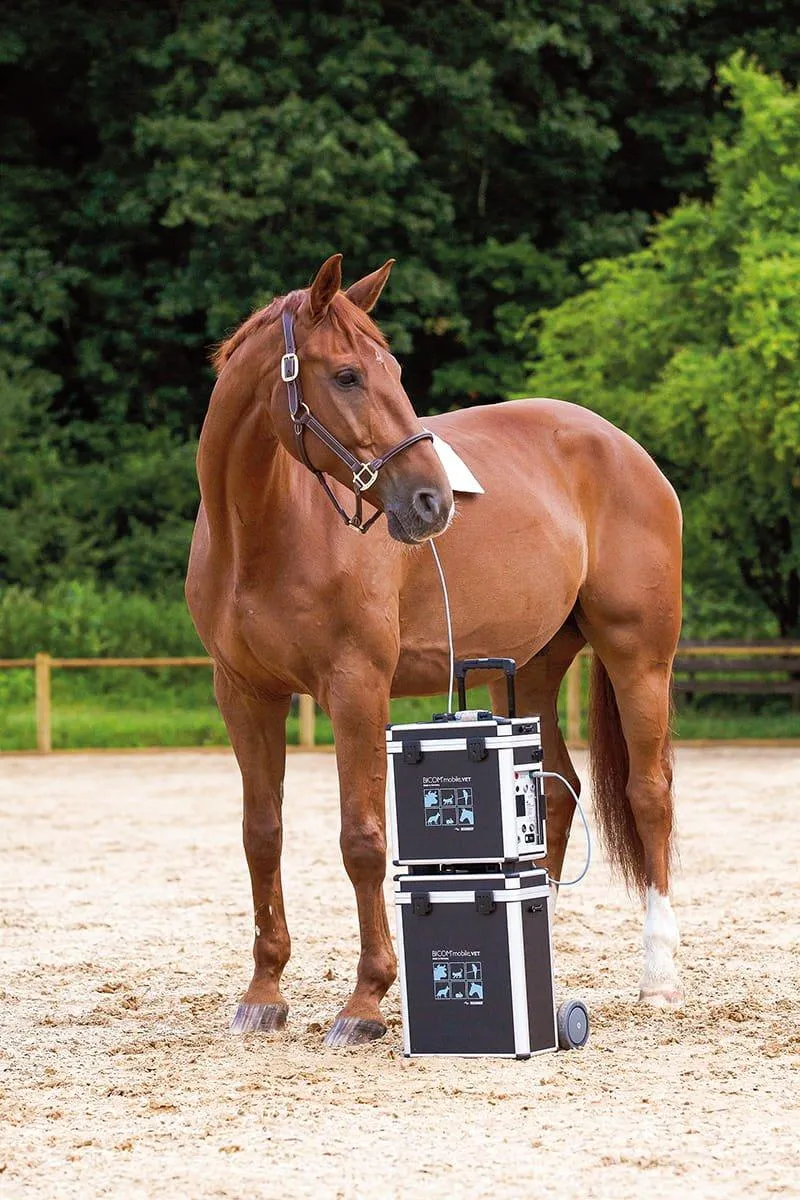Welcome to our veterinary page!
in this section, you can discover what bioresonance therapy is and how it can be a useful tool to enhance your veterinary practice.
Bioresonance therapy is an alternative treatment method that uses electromagnetic frequencies to address imbalances in the body. When applied to animals, it can help to alleviate a range of health conditions by promoting natural healing processes. This non-invasive therapy is gaining popularity among pet owners who are looking for safe and effective ways to support their animal’s well-being. Learn more about bioresonance therapy for animals and how it may benefit your furry friend.
Bioresonance has long been used to identify and target the root cause of a variety of health problems in people. More recently, this technology has also been applied to pets and other animals with much success. BICOM® bioresonance therapy can be used in the treatment of various types of animals, including, Dogs, Cats, Horses, Rodents, Birds and more.
Would you like to know more?
A range of experiences, research and scientific studies into the efficacy of bioresonance treatment can be found on our Blog section. This is where you can view the latest findings and articles about therapy with the BICOM® or browse the article archives.
You can also learn more about the features of the specific devices in the BICOM® range through our therapy machine page. This can help you to see which product will suit you, your clients and your practice best.

Expert Ways Pet Owners Can Reduce Anxiety in Pets Naturally
How Pet Owners Can Reduce Anxiety in Pets with 3 Simple Natural Methods
Pets, like humans, can experience anxiety and stress. As pet owners, it's essential to be aware of the signs of anxiety in our pets and seek solutions to help them feel calm and secure. Whether it’s due to separation anxiety, unfamiliar environments, or loud noises, pets often need extra support to manage their emotions.
Fortunately, there are natural methods available that can help reduce anxiety in pets without the need for harsh medications. These solutions can be easily incorporated into your pet’s daily routine, ensuring they remain relaxed and happy. This article will explore three simple natural methods pet owners can use to help their pets manage anxiety.
Understanding Pet Anxiety: Why It Happens
Many pets, especially dogs and cats, can experience anxiety due to various triggers. Some common signs of anxiety include excessive barking, destructive behavior, drooling, hiding, or a loss of appetite. It’s important to recognize the signs and address the issue early on.
Common Triggers of Pet Anxiety
Separation Anxiety: Pets may become anxious when left alone for long periods.
Loud Noises: Thunderstorms, fireworks, or even traffic can trigger anxiety.
New Environments: Moving to a new home or being in unfamiliar places can be stressful for pets.
Changes in Routine: Pets are creatures of habit, and disruptions to their daily schedule can lead to anxiety.
As pet owners, it's crucial to understand that anxiety is a natural response, but it can be managed with the right strategies.
Natural Remedies for Pet Anxiety: A Safer Approach
Many pet owners opt for natural remedies to address anxiety, as they are gentle on pets and free from the harsh side effects associated with medications. These methods not only promote relaxation but also help build a sense of security in your pet.
Let’s dive into three effective, natural methods that can make a significant difference in reducing anxiety for your pets.
1. Herbal Remedies: Nature’s Solution to Stress
Herbal remedies have been used for centuries to promote relaxation and reduce anxiety. Many of these herbs are safe for pets and can provide effective relief from anxiety symptoms. However, it’s important to consult with a veterinarian before using any herbal treatment to ensure it’s appropriate for your pet’s specific needs.
Top Herbal Remedies for Pet Anxiety:
Chamomile: Known for its calming properties, chamomile can help reduce anxiety and promote restful sleep. You can give your pet chamomile tea or find supplements that contain chamomile extract.
Lavender: Lavender is widely recognized for its soothing scent. It can help alleviate nervousness and anxiety in pets. Using a diffuser with diluted lavender essential oil can create a calming environment for your pet.
Valerian Root: Valerian root is another natural remedy that helps reduce anxiety in pets. It has mild sedative effects, making it ideal for pets who experience stress during car rides or when exposed to loud noises.
How to Use Herbal Remedies:
Herbal remedies are available in various forms, including teas, capsules, tinctures, and oils. Many pet owners choose herbal supplements that are specially formulated for pets, ensuring the right dosage. When using these remedies, always consult a veterinarian to determine the correct dosage based on your pet’s size and breed.
2. Aromatherapy: The Power of Scents
Aromatherapy is another effective natural remedy for anxiety. Essential oils can influence the brain’s limbic system, which is responsible for regulating emotions. For pets, certain scents can help calm their nerves and ease anxiety. However, not all essential oils are safe for pets, so it’s important to use them with caution.
Safe Essential Oils for Pets:
Lavender: Lavender oil is one of the most popular essential oils for calming pets. It has a gentle, soothing scent that can help alleviate stress and promote relaxation.
Chamomile: Just like the herb, chamomile essential oil can help relax your pet and reduce feelings of anxiety.
Frankincense: Frankincense oil is another calming scent that can help relieve stress and promote tranquility in anxious pets.
How to Use Aromatherapy:
Diffusion: Place a few drops of essential oil in a diffuser to release calming scents into the air.
Topical Application: For pets that tolerate it, you can dilute essential oils in a carrier oil (such as coconut oil) and apply it to your pet’s skin. Focus on areas like their paws or neck.
Scented Products: Some pet owners prefer to use specially designed products like calming collars or sprays that are infused with essential oils.
Before using aromatherapy on your pet, always ensure the essential oils you choose are pet-safe and consult a veterinarian if you have any concerns.
3. Exercise and Routine: Creating a Calm Environment
One of the simplest and most effective ways to reduce anxiety in pets is through regular exercise and a consistent routine. Pets, especially dogs, need physical and mental stimulation to stay happy and healthy. A lack of activity can lead to boredom and stress, which can escalate anxiety.
Benefits of Regular Exercise:
Energy Release: Exercise helps burn off excess energy, leaving your pet feeling more relaxed and content.
Mental Stimulation: Walks, play sessions, and training exercises provide mental stimulation, which can reduce stress and anxiety.
Endorphin Boost: Physical activity triggers the release of endorphins, which help improve your pet’s mood and reduce feelings of anxiety.
Establishing a Consistent Routine:
Predictable Schedule: Pets thrive on routine, so try to maintain regular feeding times, walks, and play sessions. This predictability can help reduce anxiety and give your pet a sense of security.
Calming Environment: Create a quiet, comfortable space in your home where your pet can retreat when feeling anxious. A designated spot for relaxation can help them feel safe and secure.
Relaxation Activities: Gentle massage, low-stress activities, or playing soft music can help calm your pet and ease anxiety.
For pet owners, finding the right balance of exercise, play, and relaxation is key to helping your pet manage anxiety effectively.
Why Natural Methods Are Effective for Pet Anxiety
Natural methods offer a holistic and safe approach to reducing anxiety in pets. By using herbs, aromatherapy, and exercise, pet owners can provide their pets with the tools they need to feel calm and secure. These methods can be used alone or in combination with one another for maximum effect.
The benefits of using natural remedies include:
Fewer side effects compared to medications.
Long-term relief, addressing the root cause of anxiety.
Cost-effective solutions that are often easier on the wallet than prescription medications.
Better overall well-being for your pet, as these methods promote relaxation and reduce stress without harsh chemicals.
Next Steps for Pet Owners: Helping Your Pet Manage Anxiety
If you’ve noticed signs of anxiety in your pet, it’s important to take action. Try incorporating one or more of these natural remedies into your pet’s routine to help them feel more at ease. Speak with your veterinarian for advice on the best approach for your pet’s specific needs, and consider using these methods as part of a long-term plan for managing anxiety.
By taking proactive steps, pet owners can help their pets live happier, more relaxed lives free from the burden of anxiety.
FAQs About Reducing Pet Anxiety Naturally
1. What are common signs of anxiety in pets?
Excessive barking, hiding, drooling, destructive behavior, and loss of appetite are common signs of anxiety in pets.
2. Are herbal remedies safe for pets?
Herbal remedies like chamomile and valerian root are safe when used in proper doses. Always consult your veterinarian first.
3. Can essential oils help reduce pet stress?
Yes, pet-safe essential oils like lavender and chamomile can promote relaxation when used correctly.
4. How often should pets exercise to reduce anxiety?
Daily exercise tailored to your pet’s breed and age can significantly reduce stress and improve overall well-being.
5. Is aromatherapy safe for cats and dogs?
Aromatherapy is safe if you use pet-friendly oils in small amounts. Avoid strong scents and consult your vet.
6. Can diet impact a pet’s anxiety?
Yes, a balanced diet with calming nutrients can help regulate mood and reduce anxiety levels in pets.
7. How does a consistent routine help anxious pets?
Routines create predictability, which helps pets feel secure and reduces their anxiety.
8. Should I use calming collars for pets?
Calming collars infused with natural scents like lavender can help soothe pets in stressful situations.
9. Are there any risks with natural remedies for anxiety?
Risks are minimal when remedies are used properly. Consult a vet to ensure safety based on your pet’s health.
10. Can massage therapy help calm my pet?
Yes, gentle massage can relax your pet, reduce tension, and improve their overall mood.
Quick Links





Facebook
Instagram
Mail